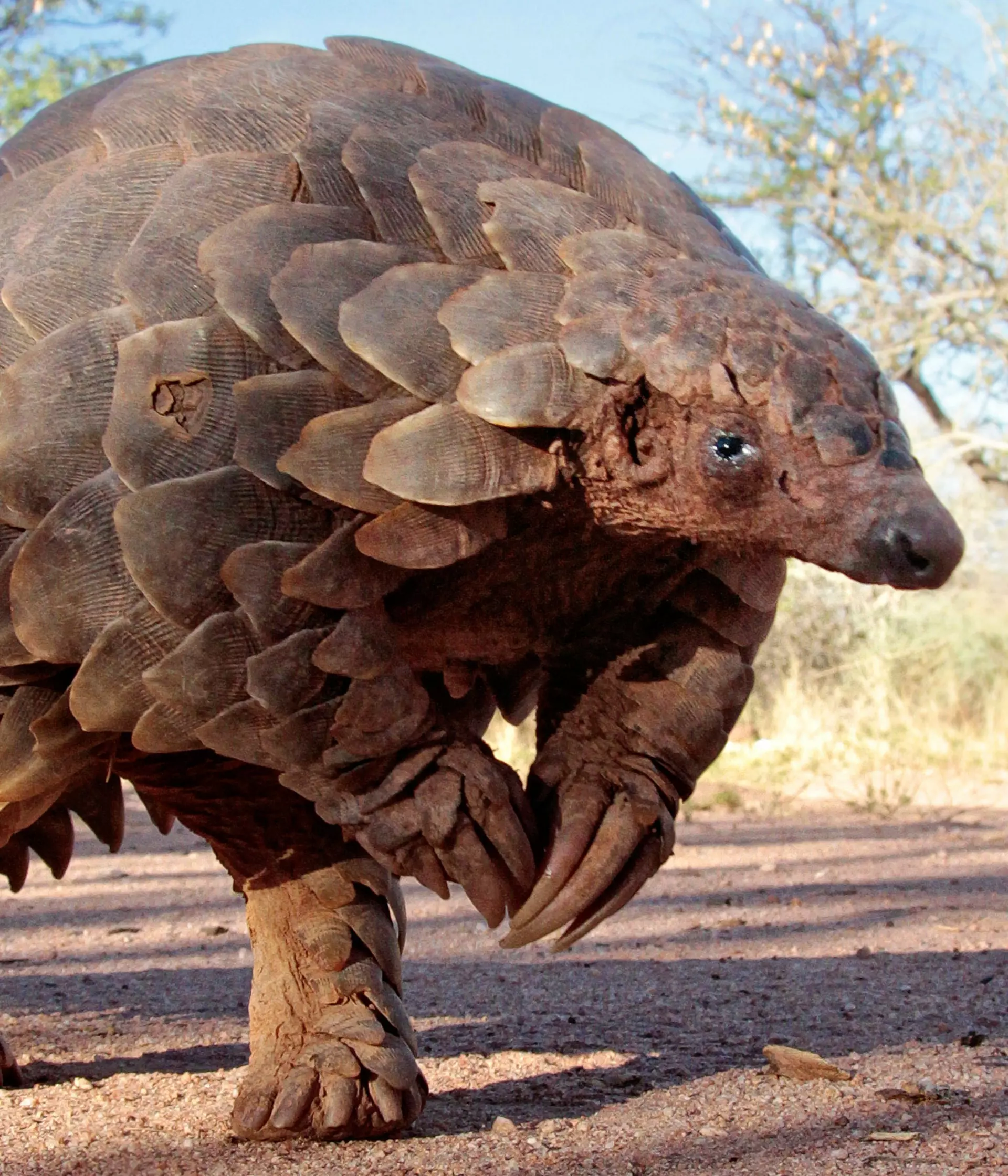Most illegally trafficked mammal
Pangolins are the most illegally trafficked mammals in the world, and some species are on the brink of extinction. We are a leading partner in their protection, restoring ecosystems, saving species and working alongside those living with these beautiful, shy and critically endangered creatures. We're working with communities living alongside pangolins, securing an international trading ban, deploying conservation experts in the field and disrupting the illegal trade through anti-poaching patrols and training law local enforcement to stabilise pangolin populations
Why are pangolins under threat?
An insatiable demand for their meat and scales has pushed the world’s pangolins to the brink of extinction. Pangolins are eaten as a luxury dish, while their scales and body parts are used in traditional medicines. This means pangolins are the most illegally trafficked animals in the world, with over one million individuals snatched from the wild in the past decade.
We’re leading global pangolin conservation work through our pioneering community work, anti-poaching patrols and working with key decision makers.
As the populations of the four Asian pangolin species plummets, traders are now looking to Africa to meet demand from markets in East and Southeast Asia. Our science-led pangolin conservation is fighting back by finding innovative solutions that work for wildlife, people and the planet.
What are pangolins?
Pangolins are the world’s only scaly mammals. Their scales are made of keratin, which is the same protein found in rhino horn and human fingernails.
These super-strong scales overlap like artichoke leaves, and when attacked pangolins roll up in a ball to protect themselves that is so tough even a lion can’t hurt them. However, this doesn't help defend them against poachers, who can just pick them up and put them in a sack.
Pangolins have long, powerful claws that are perfect for ripping open ant nests and super long sticky tongues to pick up ants and termites. Their tongues are attached all the way back near their pelvis and are sheathed in a chest cavity.
There are eight species in total, four of which are from Asia and four are from Africa. All eight species of pangolin are listed as threatened with extinction on the IUCN Red List.
Pangolin conservation at ZSL
We’re changing the fate of pangolins across the globe. We’re leading cutting edge work on the ground, working with key decision makers and influencing attitudes to wildlife through our conservation zoos.
Community-based pangolin conservation in Nepal
We’re pioneering two community managed pangolin conservation areas to protect wild pangolin populations. We’re working with the local community to help people achieve their career goals, so they don’t have to work in the illegal wildlife trade.
We’re training all kinds of law enforcement staff – from protected area managers, to investigators, prosecutors and judges – to have the skills and shared intelligence to prosecute traffickers, especially higher-level traders and criminal kingpins.
Pangolin scale seizures
Our training of Central African and Asian conservationists is successfully leading to record breaking seizures.
In Benin, anti-trafficking officials we trained sized more than half a tonne (500kg) of trafficked pangolin scales in a single operation. The seizure, made at Cadjehoun Airport in Benin’s capital Cotonou, a record for the West African country’s efforts to stem wildlife crime. Approximately 1,500 pangolins were killed to make up the haul, which was likely destined for Asian markets. The team arrested four men and seized 23 bags of scales in an operation that exposed a previously unidentified smuggling route for wildlife traffickers.
We established a mentor scheme to train a team of Central African and Asian conservationists to protect pangolins in Central Africa. This MENTOR POP scheme in collaboration with USFWS is working to achieve population stability in Central Africa.
Our pangolin conservation initiative
We launched a two-year Pangolin Conservation Initiative, supported by Fondation Segré and Save Our Species. We established the protection of four species of pangolin through supporting anti-poaching patrols and training law enforcement at poaching hotspots in Cameroon and Thailand, and by initiating work to reduce demand for pangolin products in China.
Pangolins on the EDGE
Out of more than 5,000 species, the Chinese and Sunda pangolins are ranked 17th and 18th on the Evolutionarily Distinct and Globally Endangered (EDGE) mammals list because of their unique evolution and the critical threat to their existence.
We have supported two EDGE Fellows (local conservationists) to lead projects on the Chinese and Sunda pangolins in Nepal and Vietnam, and we’re supporting an EDGE Fellow focusing on the Sunda pangolin in Thailand as part of the Pangolin Conservation Initiative.
IUCN SSC Pangolin Specialist Group
We’re leading efforts to study pangolins and find practical solutions to the threats they face, and implementing conservation solutions to ensure the long-term survival of pangolins in Africa and Asia.
More about the IUCN SCC Pangolin Specialist group
ZSL pangolin policy work
We successfully spearheaded proposals to ban international trading of pangolins to to the Convention on International Trade in Endangered Species of Wild Fauna and Flora (CITES CoP 17). The Parties to CITES voted to support all our proposals, meaning that there is now significantly increased international support to protect pangolins internationally.
Urgent action to help people and wildlife live better together, is the only way to save the pangolins we love. That’s where ZSL comes in, and where you can play your part.
